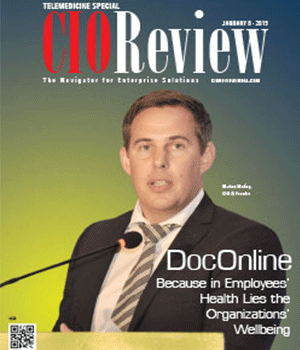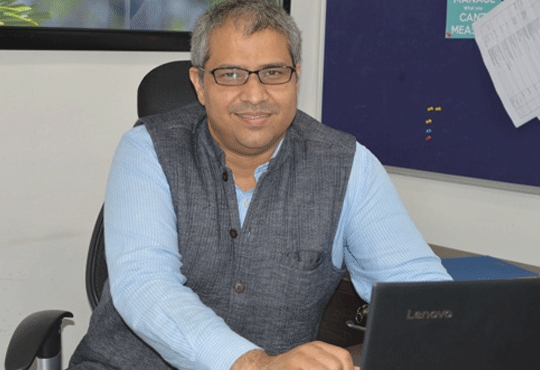
"Role Of Technology in connecting all stakeholders to improve the patient journey in a hospital"
Amit Sharma, Head - Strategy & IT, Cytcare Cancer Hospital | Thursday, 10 January 2019, 06:25 IST
 Don’t make use of excellent technology, rather make excellent use of technology”.
Don’t make use of excellent technology, rather make excellent use of technology”.
This should be the guiding principle for the CIO of any hospital. Technology can be an enabler in solving some of the more classical issues faced by hospitals while also empowering patients to better care for their health.
Today, healthcare patients view themselves as customers of the hospital, and hence not only expect treatment but a good all round experience. In order to cater to such demands, hospitals are making concerted efforts to deliver on a patient-centric business model. A large part of these efforts involve leveraging technology - the right systems and right solutions - to improve patient outcomes and experiences and cultivate long-term relationships between patients and hospitals.
"As hospitals continue moving towards patient centric models, technology will play an increasingly important role in helping create a stronger patient- hospital bond"
In a nutshell, the endeavor of any healthcare provider is to efficiently manage an individual’s hospital journey. This journey can be broken down into pre-treatment, during treatment, and post-treatment phases.
Similar to most buying decisions, the pre-treatment phase of the patient journey sets the stage for a patient’s entire interaction and experience with a medical facility and its staff. Just as a traveler might research multiple hotels before booking a room, medical consumers also wish to have options and access to all the information they will need to arrive at the best possible choice(s) for themselves. Hence at this critical decision making stage, it’s imperative for hospitals to effectively communicate with prospective patients, educate them on the facility’s superior care and reputation for excellence, overview the staff’s qualifications and experience in various disciplines, and highlight specialty areas of care relevant to the patient’s needs.
In today’s digital era, the first interface of a patient with a hospital is the website. This has led to medical centers’ populating their website with detailed information, enabling the prospective patient to access medical conditions similar to theirs and develop insights into the specialty departments, the medical procedures and the treatment involved.
Once the patient is registered with the hospital, the organizations provide them access to Patient portals; wherein patients can access their personal record of illnesses, ongoing medication, treatment, progress and personal communication with their doctors while also availing of their doctor’s advice in real time. All details viz; from the patient’s first visit to medical tests to the current ongoing medical treatment are available to the medical expert treating the patient. They are thus able to monitor the patient very closely and offer changes in medication/treatment and even instruct the patient about following a distinct regimen, if required.
Within a hospital, there are several examples of technology usage, such as Hospital Information Management System, Laboratory Information Management System, Queue Management Systems, Medical Imaging Systems, among others, which all contribute to providing an enhanced patient experience. Many of these systems also include different types of messaging systems to coordinate with patients as well as healthcare providers to keep them updated on various developments such as appointment updates, test results, critical value alerts, drug reminders, etc. A simple example of technology interface in this scenario is a drug prescription resulting out of a doctor’s consultation flowing directly to the hospital pharmacy, resulting in immediate drug dispensing, thus avoiding manual interpretation errors. Linkage of online Drug Information Databases with Hospital Information Systems enables sharing of critical information such as Drug Interactions and Contraindications with the patient, thereby avoiding drug interaction cases.
During the hospital stay, technology plays an integral role in ensuring quality patient care. There are multiple touch points within a hospital where technology support is making a huge impact. An updated electronic medical record of the patient being available to the medical and nursing team is extremely helpful in ensuring timely decision making with regard to any treatment modality while also ensuring a good patient experience.
A fully functional and responsive Customer Relationship Management System (CRM) is another such example where any feedback from inpatient can be collected in realtime and acted upon by respective stakeholders, ensuring high customer satisfaction indexes. CRM systems can also give patient-facing staff detailed information on the patients’ personal information, preferences, concerns and previous feedbacks so as to ensure real time addressal of these issues.
Another example of the role of technology in Cancer care is the Physical or Virtual Tumor Boards. Such tumor boards are globally recognized by Oncologists and were introduced to enable communications among medical specialists who are a part of the Cancer Care Network. It involves a physical as well as virtual discussion amongst individuals from multidisciplinary teams who are linked in real time through video conferencing. They discuss the specific case, exchange notes and define the most appropriate treatment, irrespective of geographical territory of the patient and the care team. The uniqueness of tumor boards is that they also offer guidance on new treatments which emerge from clinical trials
Even after discharge from hospital, a technological interface can ensure ample opportunity for improving patient experiences and thus building long term relationship with the patient. This could be through establishing a post-care journey, which comprises of postcare education, coordinating care with other provider groups (physi-otherapists, dieticians, rehab specialists, etc.), automating appointments and follow-up care reminders, among others.
Another example of the role of technology in Cancer care is the Physical or Virtual Tumor Boards. Such tumor boards are globally recognized by Oncologists and were introduced to enable communications among medical specialists who are a part of the Cancer Care Network. It involves a physical as well as virtual discussion amongst individuals from multidisciplinary teams who are linked in real time through video conferencing. They discuss the specific case, exchange notes and define the most appropriate treatment, irrespective of geographical territory of the patient and the care team. The uniqueness of tumor boards is that they also offer guidance on new treatments which emerge from clinical trials Even after discharge from hospital, a technological interface can ensure ample opportunity for improving patient experiences and thus building longterm relationship with the patient. This could be through establishing a postcare journey, which comprises of postcare education, coordinating care with other provider groups (physiotherapists, dieticians, rehab specialists, etc.), automating appointments and follow-up care reminders, among others.
CIO Viewpoint
TELEMEDICINE - Are We There Yet?
By Srivatsan Krishnan, Head IT & R&D Operations, Bristol-Myers Squibb
Strong Digital Health Capability Key to...
By Dr. Devendra Kumar Punia, CIO, Paras Healthcare
Health Care As IT Could Be In 2030
By Alan V. Abramson, Ph.D. SVP of Information Services & Technology and CIO, HealthPartners
CXO Insights
GAZING INTO MY CRYSTAL BALL: Healthcare...
By Dr. Vishal Rajgarhia, Director, Finecure Pharmaceuticals Limited, Chairman, ASSOCHAM Pharma Council, Director, Ecuador India Cha
How Intelligent Swabs Saves Lives Post-Surgery
By Dr. Sreeram Srinivasan, CEO, Syrma Technology Private Limited
INTELLIGENT CONNECTED CARE: The Future Of...







